Heidi
We have had the pleasure of working with Heidi this year to use her wool in our Woolkeepers® traceable wool initiative
Read below to find out more about Heidi and what happens on farm
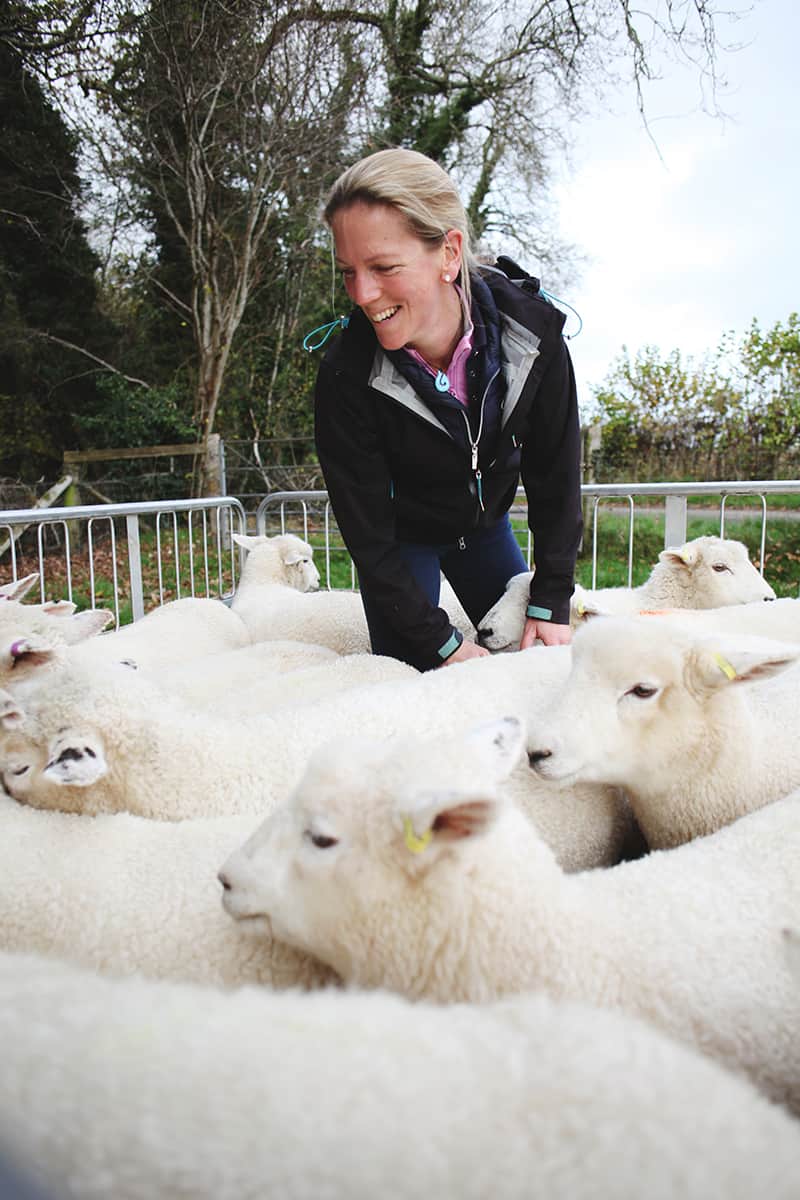
How long have you been farming for?
A change of direction in my life led me to New Zealand in early 2016. Whilst I was there I worked with sheep on a friends farm in North Canterbury, South Island and fell in love with it. When I returned I had a small inheritance from my late Granny and used it to buy my first flock of sheep – 20 North Country Mules. Fast forward 4 years (2020) and I am looking forward to my fifth lambing season with 50 Romney’s.
This wasn’t my first taste of farming but the first time I had been truly immersed in it. As a child I grew up with livestock on the family farm, but we sold the Hereford Cattle when I was 5 and the flock of 1000 North Country Mules and Suffolks when I was 9.I have fond memories being allowed a bottle fed lamb one year and visiting my Granny and Uncle’s farms who also kept sheep.
Did you ever fancy doing something else…
Farming for me is a hobby, although my friends tell me it is more than that when the flock gradually expands. My primary role is as a cook for Cellar & Pantry, catering for private parties, weddings and other events. It provides me with a happy balance of indoor and outdoor work and the two compliment each other well. I have the flexibility to be able to give the sheep the attention they need when they need it and they produce food for me to cook with. Having grown up on a farm it is very much something that is in my blood, and I relish the opportunity to be able to farm for myself through keeping sheep.
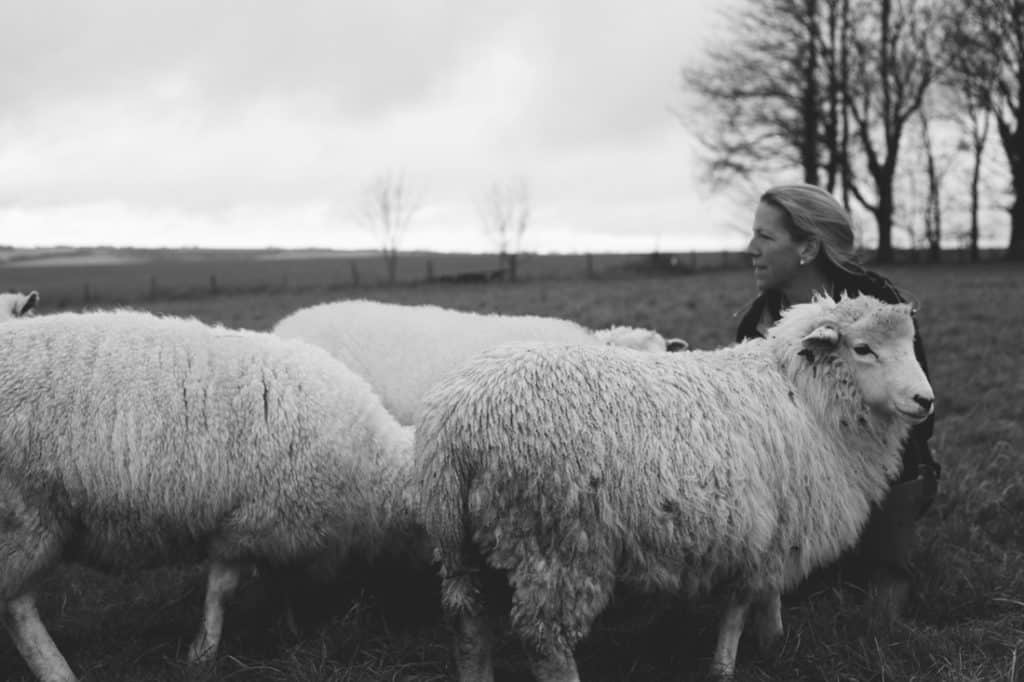
Who works on the farm with you?
My father took over running the family farm from my grandfather in 1982 (the year I was born) and he still farms on it now. When he started there were eight full time employees, now there are only part-time employees and a game keeper. The arable side of the farm is run in unison with a local contractor.
Can you give us some background on your farm?
My grandfather purchased the farm in 1952, he moved south from Cumbria in order to stand as a Liberal candidate for parliament in North Dorset (sadly he never was elected). It is mixed arable, chalk downland and woodland, there is also a shoot on the farm that my father runs. My small flock grazes the meadows and a few outlying grass fields on the edge of the chalk downland.
What is your favourite time of year on the farm?
On the arable side, I love the buzz around harvest time; the culmination of a year’s work, drilling, the start of a new season and farming year and nothing beats the smell of freshly turned earth. With my sheep I’d say the favourite time is tupping, again the start of a new season, the ewe’s are hopefully at their peak fertility for tupping and then there is the excitement of my own shearlings going to the tup for the first time.
Do you have a focused interest, i.e genetics, machinery, rare breeding, bio diversities…
I love to learn and there is so much scope to learn and develop my flock management with all the resources available; educational events, discussion groups organised by AHDB, at NSA events, from my vet and from Shepherding friends. My interests therefore are broad, the learnings might be more focused on larger scale sheep farms but there are principles I can apply to my flock.
One thing that I especially enjoy and looking forward to developing further is the selection of ewe lambs for my replacements. I am looking forward to building on this especially as my first Romney replacements are due to lamb for the first time next April.
How many sheep do you have and what breed types do you have?
Fifty-one ewe’s have gone to the tup this November for outdoor lambing starting in early April. They’re all Romney (bar one!). It’s taken a few tries to find the right sheep for me; starting out with North Country Mule’s who I purchased from the sheep grazier on the farm, this pleased my father as that was what they had here before. But I decided as soon as I had finished my first lambing that I wanted to be able to breed my own replacements. I dabbled briefly in Poll Dorsets but they were not right for me so I have settled on Romney’s and they are ace! For the past 3 years I have brought draft ewe’s from a bigger flock in the next door village and from these I can start to build up my own flock from the replacements I breed.
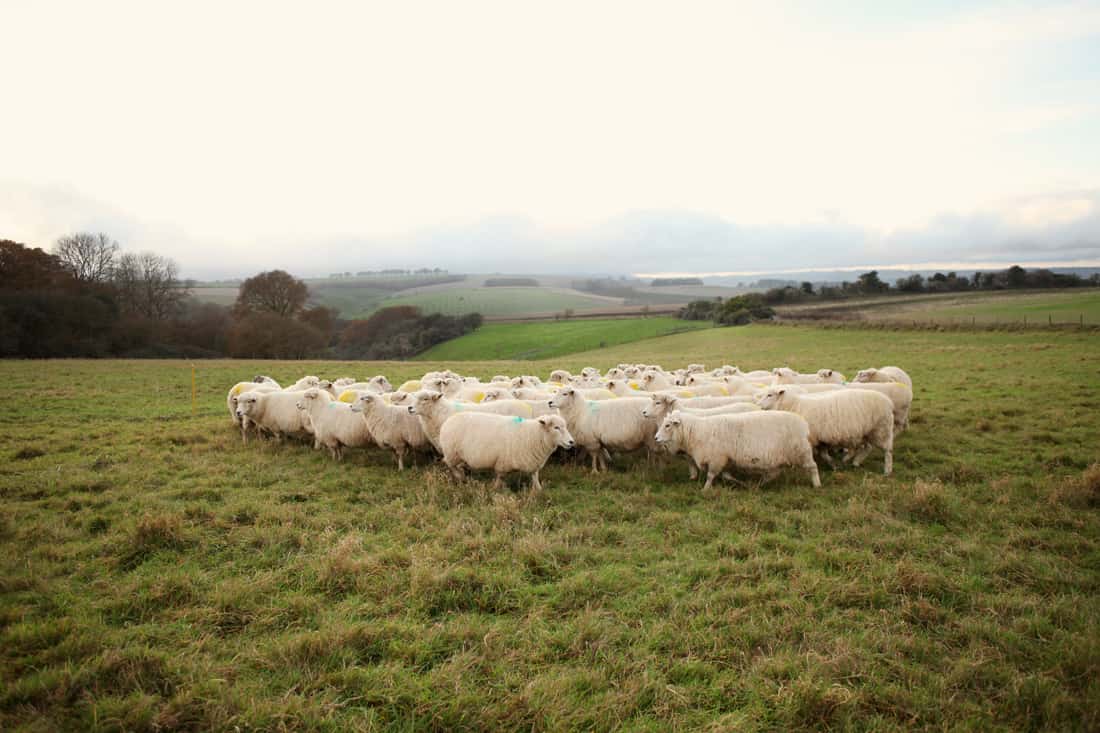
Have ever had a favourite sheep?
Yes! I had two favourites from my original start up flock and my current favourite is (the only non Romney) in the flock who is a daughter of one of these original favourites and she comes up to say “hello” every day. The Romney’s tend to like to keep their distance a bit more. I also find I get quite attached to the rams and then are usually a couple of extra bold lambs who are favourites of their year.
What do you enjoy about working with sheep?
Just about every aspect – sheep definitely make me happy. When you are working with them you are totally absorbed in the moment. The outdoors, the seasonality, lambing, sharing the farming experiences with friends and young children. Producing food and fantastic lamb to cook with. Plus, the friends I have made through sheep.
What is the great thing about your sheep?
They are hardy, perform well off grass and easy to manage, especially at lambing time. Romney’s also flock together, I don’t have a dog or quad so this makes life easier for me as I do it all on foot. Finally, they have fabulous wool, and lots of it.
What is the hardest part in working with sheep?
It is physical, but I like that. Lambing is tiring and can be emotionally challenging with extreme highs and lows. With another job, problems can occur when I am already busy, but they are priority. A couple of years ago an hour and a half before I had 20 guests coming to a pop up restaurant night I was stripping out and treating a ewe with mastitis!
What type of land do they graze on and what is the movement of the flock throughout the year?
Edges of our chalk downland, also water meadows and my horse paddocks. Occasionally I will fence off the bottom of the garden for the rams. I rotate them around the fields I have, leaving at least three weeks break before going back onto a piece that I have grazed before and will also sub divide the fields using electric fencing to make better use of them.
How do you think farming practices have changed?
Well I’ve only been keeping sheep for four years but have certainly observed in this time how increasing numbers of farmers are becoming more progressive in their livestock management and open to new ideas, working towards more effective and efficient practises.
Can you explain “..a day in the life of…you”
Gosh I am not sure there is a typical day, but I love the variety in my life that comes from this. I am self employed which affords me flexibility when I work so for example I can take a few weeks more quietly on the cooking front around lambing time in order to give the extra attention required to the sheep or keep a clear day for specific tasks such as scanning / shearing / weaning etc. Or as I had to a few years ago slightly adjust my sheep dates to fit work as I had a wedding booked to cook early in April so timed my lambing to start after, unfortunately the ewe’s didn’t stick to the time plan and some started lambing a couple of days ahead of the wedding which made it a bit of an interesting juggling act. As I don’t have to go to an office every day to work at fixed times I am able to fit the sheep tasks in as necessary and either start cooking very early in the day before, say taking lambs to the abattoir in the afternoon, or until late in the evening if I have done sheep jobs during the day. Or I might take a break at lunchtime to do some electric fencing. If I do sheep jobs at weekends I have willing friends who love to come and help, for example the fortnightly lamb weighing done from June until mid October definitely needed a plus one the first few times whilst the lambs were young and had to be drafted off from the ewe’s.
I also have to call on friends and family members to help if I am wanting to move them on foot around the farm, as I don’t have a dog I cannot do this single handed. The sheep are a great contrast to my cooking which can be really intense at busy times, but when I step away to work with the sheep they are totally absorbing so are a welcome tonic. One thing that is a constant on my day to day is checking them all.
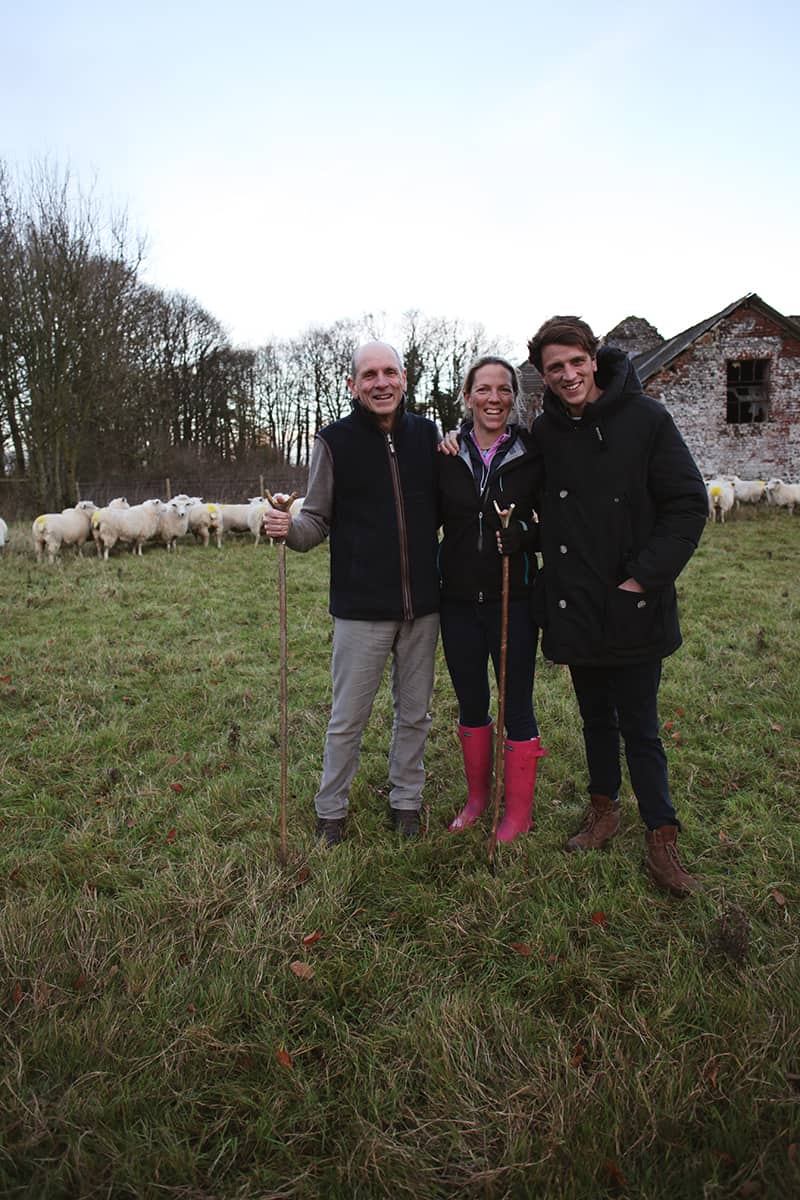
What do you love about wool ?
Wool is a very versatile fibre, it’s natural which makes it a good alternative to man-made plastic fibres for the environment plus it has great functional qualities such as; hypoallergenic, regulates temperature and is soft to handle. I think the range and diversity of wool across British breeds is another reason to love it, each with different purposes that can be used for different functions. As a shepherd I find it interesting that it can also indicate the health of your sheep. But I also love the small and how soft my hands are after handling, so much so I have lanolin based skin products I use too.
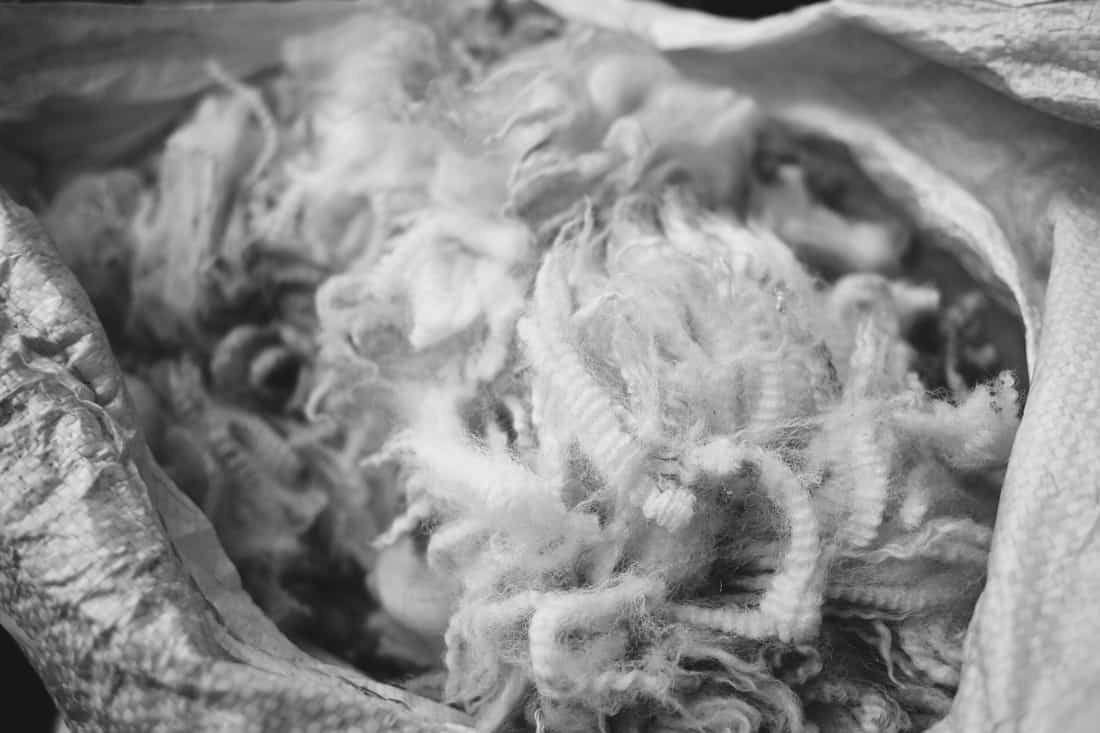
How long does it take to shear your flock?
The ewe’s and rams are shorn once a year in late June, but I plan to move this main shear to a bit later on in the summer going forward. The ewe lambs that are being kept as replacements and any lambs that are under a certain weight are shorn in early September. For me it doesn’t not take very long, just part of the day which includes set up and take down, but it is enjoyable and I always make sure to have good refreshments for the shearer once they have finished.
Have you ever used the wool yourself for anything, such as yarn or insulation?
Not my own, but I did put up wool insulation into the roof of my house as it had none when I moved (this was before I kept sheep). Also I have a Woolroom duvet and pillow, which I adore!
What do you make of Brannach Olann becoming an ethical wool sourcing route for farmers?
I think it’s fantastic and it is inclusive of farmers of all sizes! Raising the profile of wool and the care and attention that goes into keeping sheep gives us a rightful sense of pride in this versatile product we produce, and it adds value to it. I think it is vitally important to connect the consumer to what they are buying and the traceability scheme does this brilliantly, giving the consumer confidence that they are buying assured quality products from flocks of a high welfare standard. Farming is under ever increasing scrutiny and subject to much misunderstanding, for consumers to be able to meet the farmers and see what we are doing, why and how it benefits the sheep is very important. I love being able to tell people exactly where my wool goes so the connection is not just for the consumer but the farmer, wool buyer and manufacturer too.
Close the loop and find out what we made?
The Woolkeepers® initiative has captured both transparency and traceability in a unique wool assurance scheme which traces wool from farm gate to shop front. Our visibility within the supply chain ensures compliance with safety, sustainability and welfare requirements. Each time we process wool, we create a unique identifier which traces the batch back to farm, as well as forward to our customer.
This batch of wool went to a rural retailer bases in the heart of England to make home interior products.
